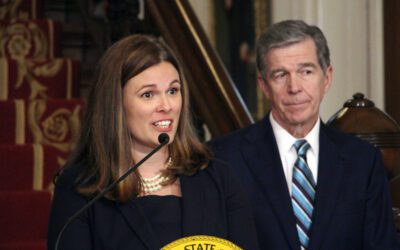
A Morganton, N.C. resident walks through a flooded area last month. (AP Photo/Kathy Kmonicek, File)
The early voting period runs from Oct. 17 to Nov. 2, and despite the damage caused by Hurricane Helene, election officials will open nearly all of the scheduled sites. “The people of western North Carolina will vote,” Board of Elections executive director Karen Brinson Bell said on Tuesday.
Hurricane Helene wiped out roads and bridges, destroyed homes and livelihoods, and washed away entire communities in western North Carolina just over two weeks ago.
It will not, however, stop them from voting.
Despite Helene’s widespread damage, Early Voting will begin as scheduled on Thursday in all 100 counties, with only minimal effects on the process, state election officials said on Tuesday.
Before the storm, there were 80 scheduled early voting sites in the 25 counties listed in the federal disaster declaration issued by Gov. Roy Cooper.
“We are very proud of this next statistic,” Karen Brinson Bell, the executive director of the North Carolina Board of Elections (BOE) said in a press call on Tuesday.
Voters in these counties will now have access to 76 early voting sites.
“We just lost a few, despite the extensive damage, loss of power, water, internet, and phone service,” Brinson Bell said.
She praised the work of state and local election officials, as well as the efforts from utility companies, FEMA, and other federal officials
“To have almost all early voting sites open after such a devastating storm is an effort all North Carolinians should be proud of. We are especially grateful to residents of western North Carolina who suffered greatly from the storm but who will show up to work at early voting sites this week.”
“The people of western North Carolina will vote,” she said.
RELATED: ‘Early voting in North Carolina: Your 2024 guide to when, where, and how’
Tips ahead of early voting
Early voting has been the most popular method of voting for the last several election cycles, Brinson Bell said, and she doesn’t expect that to change this year.
Early voting, which runs from Thursday until 3 p.m. on Saturday Nov. 2, is also the last chance you have to register to vote.
While voting will look the same in most locations, the General Assembly unanimously passed a $273 million aid package last week that included several changes to the voting process in the 25 counties most affected by the storm.
Most of the changes mirrored those unanimously adopted by the BOE, a bipartisan entity.
Voters who are registered in the 25 counties and wish to vote by mail, for example, can now drop off their absentee ballots at any early voting site in the state, not just in their home counties.
The BOE issued a list of tips ahead of the early voting period:
- Eligible voters may cast a ballot at any early voting site in their county. For sites and hours in all 100 counties, use the Early Voting Sites Search tool. The busiest days for early voting are often the first day and the last couple of days.
- You can register and vote at the same time during the early voting period. Just bring proof of residence and acceptable voter ID. (See here for information on IDs, including the list of what is accepted.)
- Voters will still have to bring a photo ID, but if your ID was damaged or lost in the hurricane, that qualifies for one of the accepted exemptions under state law. Just fill out the ID exception form at the polling place. Anyone else who doesn’t have an ID can fill out the same form.
- Any registered voter who needs a photo ID can get one for free from their county board of elections office during the early voting period.
- Sample ballots are available through the voter search tool.
- Voters registered in the 25 counties in the Helene disaster area in western North Carolina may return their absentee ballot to any early voting site in the state during early voting hours. Ballots will be kept secure and delivered to the voter’s county board of elections for processing.
- Voters who requested an absentee ballot but have not yet returned it may choose instead to vote in person during the early voting period or on Election Day, November 5. Voters may discard the absentee ballot and do not need to bring it to a voting site.
- Voters in need of assistance may bring an eligible person to help them enter and exit the polling place or to help them complete their ballot. Election officials are also available to help voters. Curbside voting is also available for voters unable to enter the voting site.
- All voters should respect the rights of others to participate in the election. Election officials are trained to quickly address incidents that might interfere with a voter’s ability to cast their ballot. Intimidating any voter is a crime. Voters who feel harassed or intimidated should notify an election official immediately.
Other matters
- Despite concerns that people who had signed up to be poll workers in these counties may no longer be able to fulfill their duties. Brinson Bell said that county boards of election in these areas have said that they expected to have the staffing they need, both during the early voting period and on Election Day.
- The county boards of elections are still finalizing their plans for Election Day to ensure each voting site has adequate facilities, Brinson Bell said. But she expected that the “vast majority [of Election Day sites] are going to be open and available to the voters in some shape or form.”
- It may look a little different at some sites that saw damage, and they may need to rely on FEMA and other entities to provide power and facilities, but North Carolinians will still be able to vote safely, freely, and securely, she said. “It might require a generator, it might require a Porta-Potty, but we are getting those sites open,” she said.
- Disinformation tied to Helene has hampered the recovery effort and prompted threats against FEMA officials, but there have been concerns that the threats could increase for election officials as well.
Brinson Bell said that neither the state nor county boards had received any threats that needed to be passed to law enforcement, but there are security measures in place, she said.
She also reminded people that threats against and harassment of poll workers or voters is illegal and would be prosecuted.
“You can’t hide behind a screen,” she said.”Your words on social media or in a text message or in an email can be just as prosecutable as anything you might be willing to say to my face.”
But she hoped that the landscape online would better mirror the sense of unity she had seen on the ground in the storm’s wake.
“When you [spread disinformation] you are threatening someone who is your former English teacher, your former scoutmaster, your basketball coach, the person you pass in the grocery store,” Brinson Bell said.
“They are members of your community.”
Support Our Cause
Thank you for taking the time to read our work. Before you go, we hope you'll consider supporting our values-driven journalism, which has always strived to make clear what's really at stake for North Carolinians and our future.
Since day one, our goal here at Cardinal & Pine has always been to empower people across the state with fact-based news and information. We believe that when people are armed with knowledge about what's happening in their local, state, and federal governments—including who is working on their behalf and who is actively trying to block efforts aimed at improving the daily lives of North Carolina families—they will be inspired to become civically engaged.


Opinion: N.C. can’t let sore loser candidates undermine our democracy
This column is syndicated by Beacon Media and is available to republish for free on all platforms under Beacon Media’s guidelines. A few months...

Opinion: How higher ed can champion and support young voters
Young people hold tremendous voting power. This past year, Gen Z included 41 million potential voters. In battleground states, young voter turnout...

NC’s Republican-controlled elections board fired an award-winning, non-partisan director. Read her forceful goodbye.
Republicans fired Karen Brinson Bell then tried to prevent her from thanking elections staff. When she began to speak anyway, Republican members...

Six months after he lost, Jefferson Griffin concedes to Allison Riggs
While Griffin’s effort to steal last year’s NC Supreme Court election was thwarted, it opened a door to a reality where partisan courts could try to...








